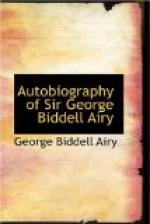The Opponents named to attack these assertions were Hamilton of St John’s, Rusby of St Catharine’s, Field of Trinity. It was customary for the Opponents to meet at tea at the rooms of the Senior Opponent, in order to discuss and arrange their arguments; the Respondent was also invited, but he was warned that he must depart as soon as tea would be finished: then the three Opponents proceeded with their occupation. As I have acted in both capacities, I am able to say that the matter was transacted in an earnest and business-like way. Indeed in the time preceding my own (I know not whether in my own time) the assistance of a private tutor was frequently engaged, and I remember hearing a senior M.A. remark that my College Tutor (James D. Hustler) was the best crammer for an Act in the University.
At the appointed time, the parties met in the Schools: the Respondent first read a Latin Thesis on any subject (I think I took some metaphysical subject), but nobody paid any attention to it: then the Respondent read his first Dogma, and the first Opponent produced an argument against it, in Latin. After this there were repeated replies and rejoinders, all in viva voce Latin, the Moderator sometimes interposing a remark in Latin. When he considered that one argument was disposed of, he called for another by the words “Probes aliter.” The arguments were sometimes shaped with considerable ingenuity, and required a clear head in the Respondent. When all was finished, the Moderator made a complimentary remark to the Respondent and one to the first Opponent (I forget whether to the second and third). In my Respondency of 1822, November 6, the compliment was, “Quaestiones tuas summo ingenio et acumine defendisti, et in rebus mathematicis scientiam plane mirabilem ostendisti.” In an Opponency (I forget when) the compliment was, “Magno ingenio argumenta tua et construxisti et defendisti.”
The Acts of the high men excited much interest among the students. At my Acts the room was crowded with undergraduates.
I imagine that, at a time somewhat distant, the maintenance of the Acts was the only regulation by which the University acted on the studies of the place. When the Acts had been properly kept, license was given to the Father of the College to present the undergraduate to the Vice-Chancellor, who then solemnly admitted him “ad respondendum Quaestioni.” There is no appearance of collective examination before this presentation: what the “Quaestio” might be, I do not know. Still the undergraduate was not B.A. The Quaestio however was finished and approved before the day of a certain Congregation, and then the undergraduate was declared to be “actualiter in artibus Baccalaureum.”
Probably these regulations were found to be insufficient for the control of education, and the January examination was instituted. I conjecture this to have been at or shortly before the date of the earliest Triposes recorded in the Cambridge Calendar, 1748.




